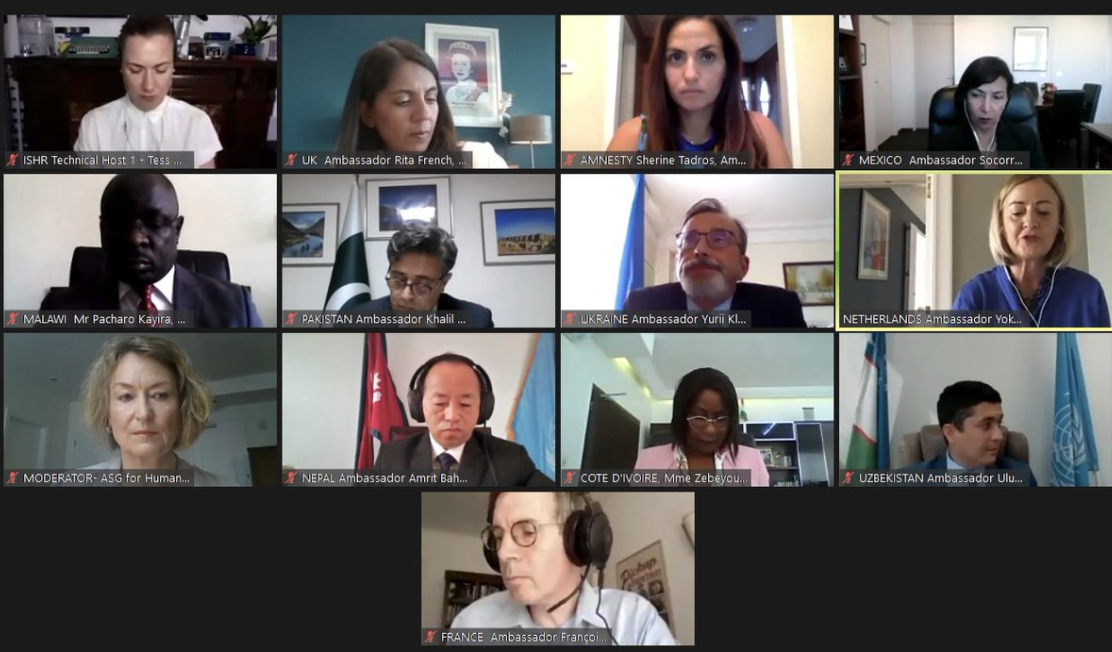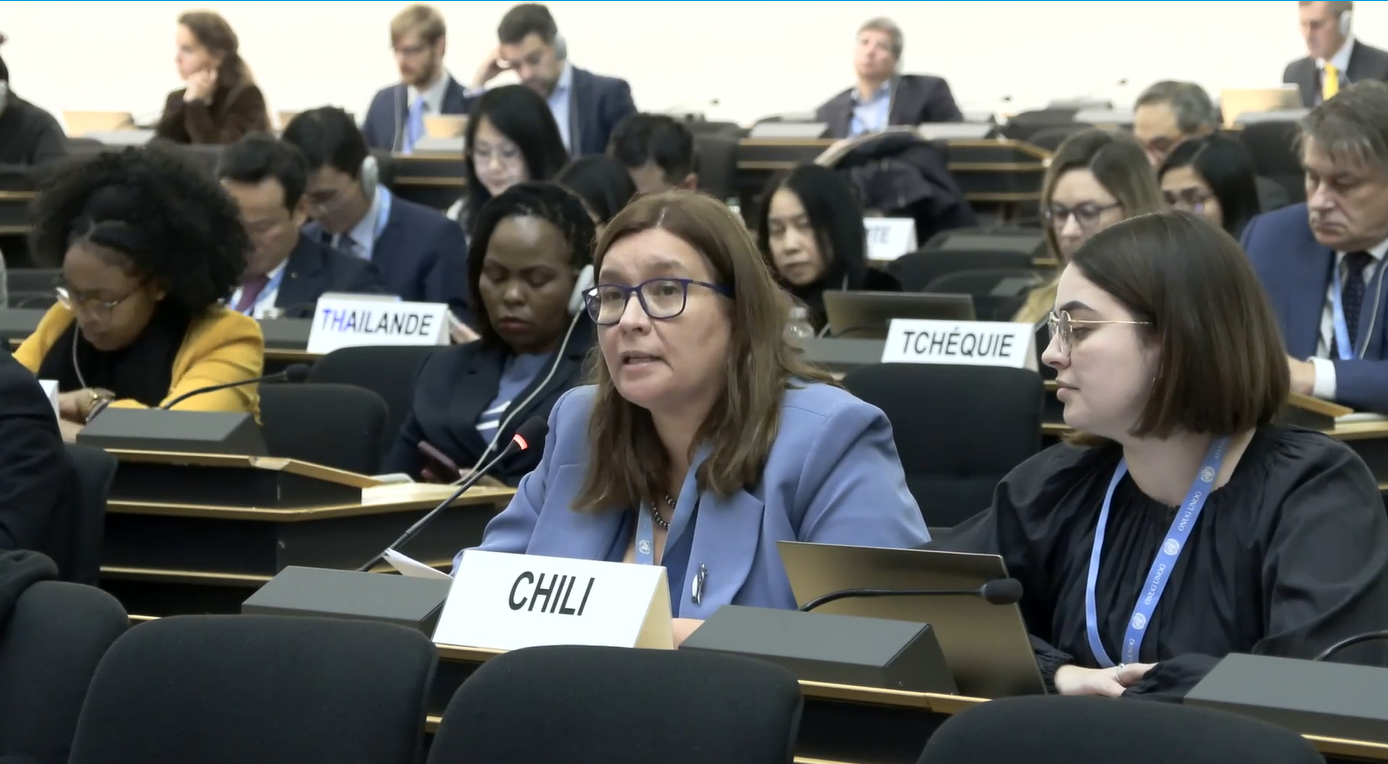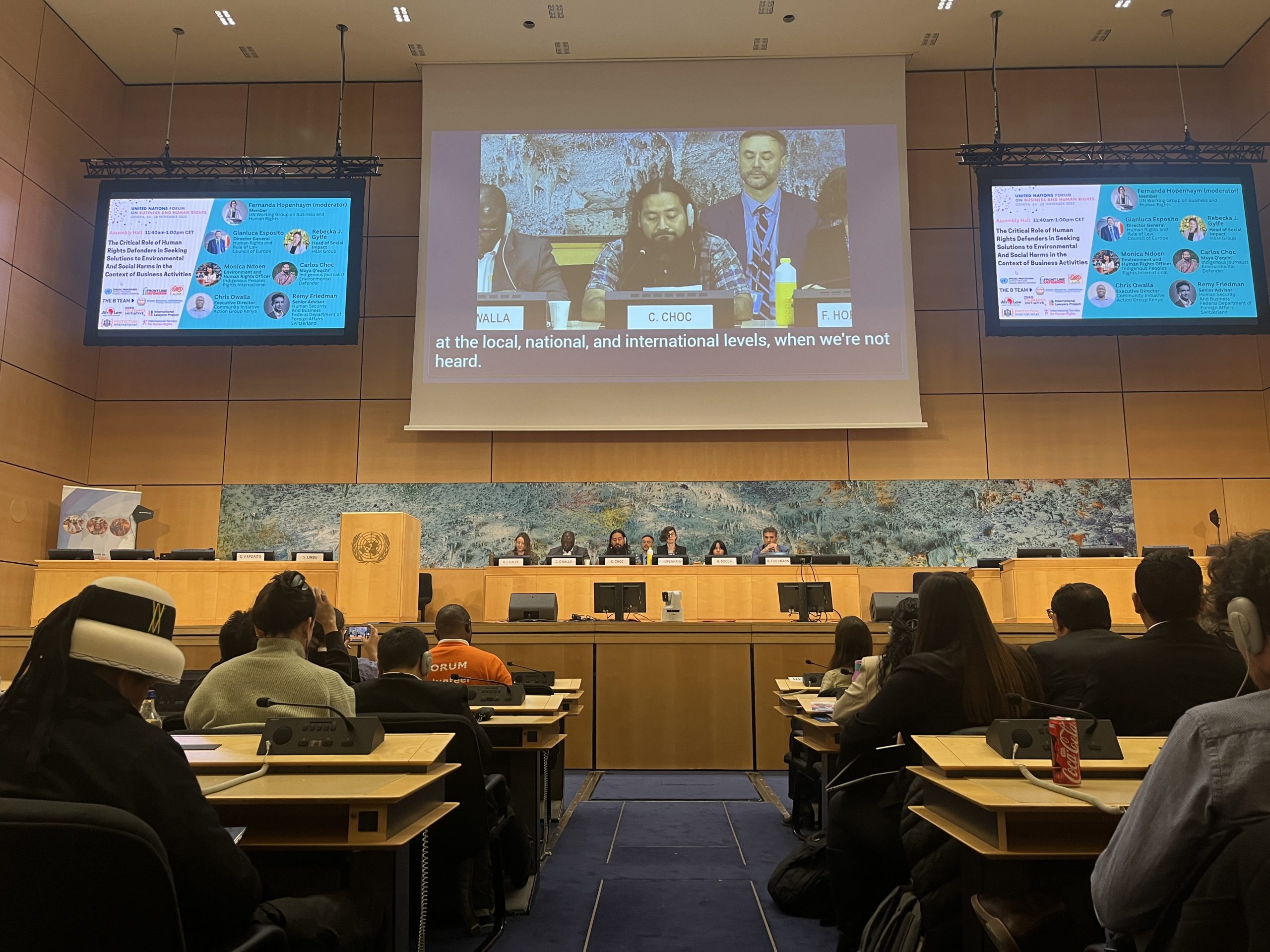In advance of the Human Rights Council elections that will take place this autumn for the membership term 2021-2023, Amnesty International and the International Service for Human Rights held an online pledging event for candidate States on 9 September 2020.The Pledging Event provides a critical opportunity for civil society to directly and constructively engage with candidate States for the Human Rights Council, the chief UN body examining protection and promotion of human rights.
The goal of the Pledging Event is to enhance transparency and accountability in Human Rights Council elections and improve adherence to Council membership standards. It is intended to give candidates an opportunity to present their visions for Council membership and to respond to questions from a range of stakeholders on how they propose to realise the pledges and commitments made in seeking election. State representatives, civil society, national human rights institutions and other key stakeholders are invited to participate in the event and pose questions to candidates. Given the COVID pandemic, this was the first time that the event was held online enabling greater participation and access, irrespective of geographical location.
Nine of the fifteen candidates that were invited joined the event, namely Cote d’Ivoire, France, Malawi, Mexico, Nepal, Pakistan, the United Kingdom, Ukraine and Uzbekistan. The countries that declined to attend the event included Bolivia, China, Saudi Arabia, Senegal, Cuba and Russia. Their decision not to participate is particularly disappointing, and suggests a lack of commitment to participate in global efforts to enhance transparency, dialogue and accountability.
All candidate States were asked what they hope to achieve through their Human Rights Council membership – both at national and international level. Candidate States were also asked general as well as country-specific questions from the audience.
During the event, candidate States provided a range of responses to questions asked, as well as commitments, including:
- Cote d’Ivoire confirmed that separation of children and adults in detention premises was a priority, and that work to separate the Center for the Observation of Minors (COM) from the Abidjan House of Arrest and Correction (MACA) would probably be completed by 2021.
- In response to the question of whether France would end licensing for and deliveries of arms, ammunition and military equipment to all warring parties in Yemen, France responded that it was in talks with domestic and international stakeholders including NGOs.
- Malawi highlighted that they have released prison inmates to reduce overcrowding of prisons in efforts to protect vulnerable populations during the pandemic.
- In response to a question on steps being taken by the Mexican government in light of increased targeting of human rights defenders in the country, Mexico responded that it is committed to working with all stakeholders including civil society and UN mechanisms in strengthening protection mechanisms for journalists and defenders, acknowledging their fundamental role in the protection and promotion of human rights and maintaining a healthy democracy and the rule of law.
- Nepal stated that it is committed to inclusive and equitable multilateralism and would engage actively with the treaty bodies and other mechanisms. It reiterated its commitment to protecting LGBTIQ rights and strengthening transitional justice mechanisms through a victim-centred approach.
- Pakistan reiterated its commitment to the realisation of human rights for peaceful and inclusive societies and to addressing the issue of enforced disappearances, media freedom and furthering the rights of minorities.
- The United Kingdom stated that it would be bringing forth a resolution on a core group on the human rights situation in Syria in the forthcoming human rights session.
- Ukraine stated that in response to its international obligations, at a national level it incorporates a human-rights approach to decision making, policy making and implementation.
- Uzbekistan reiterated its commitment to cooperate with mandate holders and stated that it has accepted the recommendation to issue standing invitations to all special rapporteurs.
Nepal, Mexico, Ukraine, the United Kingdom and Uzbekistan welcomed Australia’s initiative of a pledge for incoming Council members. In doing so, the United Kingdom acknowledged that endorsement and compliance by all Council member States was essential to enhancing the Council’s credibility. Mexico, Nepal, Pakistan, Ukraine and United Kingdom committed to making their required financial contributions to the UN institutional bodies in a timely manner.
Questions were also raised for candidate States that declined to participate.
- Bolivia was asked what actions it would take to strengthen protection for land and environmental rights defenders and to repeal legal provisions such as Law 351 which violates the right of freedom of association.
- China was asked to elaborate the extent to which it meets the criteria for Council membership given its deeply troubling human rights record against religious minorities.
- Cuba was asked how it met the criteria for Council membership given its history of voting in against human rights such as voting against humanitarian assistance to Venezuela.
- Russia was asked what actions it would take during its Council term to promote accountability in Syria.
- Saudi Arabia as asked how is would investigate human rights violations including torture, particularly in light of the current detention and persecution of women’s rights defenders.
- Finally, Senegal was asked how it would ensure enforcement of existing laws and protect children in Koranic schools from forced begging and abuse, beyond returning children to their parents during COVID.
The complete list of questions for candidate States can be found here: Bolivia, Cote d’Ivoire, China, Cuba, France, Malawi, Mexico, Nepal, Pakistan, Russia, Saudi Arabia, Senegal, United Kingdom, Ukraine and Uzbekistan. We welcome the complete written responses received from Cote d’Ivoire and France and are disappointed at the lack of responses to questions posed to other candidate States.
The event was generously co-sponsored by the Marshall Islands and Netherlands with financial support from Canada and the Czech Republic. It was moderated by Ilze Brands Kehris, UN Assistant Secretary-General for Human Rights.
For more information concerning the upcoming Human Rights Council election, view ISHR scorecards which offer a quick ‘at-a-glance’ overview of the candidates’ relationship with UN human rights mechanisms including their cooperation with the Council, their support for civil society, their engagement with UN treaty bodies and Special Procedures, among others. This year, along with national civil society we created recommendations and sent letters to candidate States urging them to commit to and implement a series of concrete measures, should they be elected to the Council. We have also listed indicators which we will use to closely monitor the implementation of those recommendations throughout the candidates’ membership term.
Photo: ISHR
Contacts: Tess McEvoy, [email protected] and Salma El Hosseiny, [email protected].




